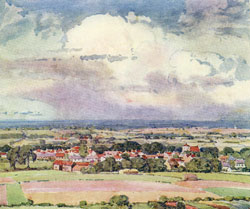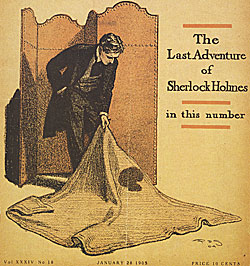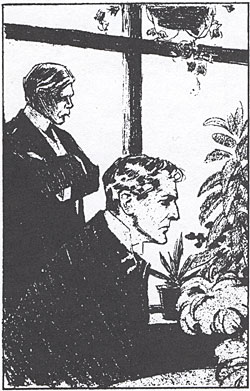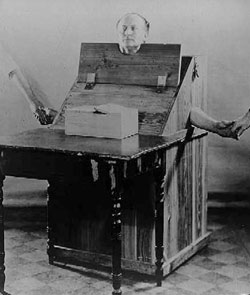|
Notes l Bibliography l Download Issue 8 
 |
|
A view from the Sussex Downs toward the sea. From Viscountess Wolseley, Sussex in the Past, The Medici Society, London & Boston, 1928 |
...but since he has definitely retired from London and betaken himself to study and bee-farming on the Sussex Downs, notoriety has become hateful to him, and he has peremptorily requested that his wishes in this matter should be strictly observed.... (1)
Conan Doyle did not quite dare kill Holmes again, after the dramatic public reaction to "The Final Problem," but he made a tentative move towards ending the stories by retiring the detective. (At this point in his career, Conan Doyle was one of the world's highest-paid authors. For the six stories beginning with "The Empty House," he had received $25,000 from the American magazine Collier's Weekly, and £100 per thousand words from The Strand.)
The Sussex Downs are a series of chalk hills that end in cliffs at the sea. The North and South Downs are separated by a lower, wooded area called the "Weald." We learn later that Holmes has retired to the South Downs, and that his home lies in East Sussex, near the sea. The exact location of Holmes's retreat has been the source of much speculation. In "The Lion's Mane," Holmes says that it lies "upon the southern slope of the Downs, commanding a great view of the [English] Channel."
It was only upon my representing to him that I had given a promise that "The Adventure of the Second Stain" should be published when the times were ripe.... (1)
Watson mentioned this case by name in "The Adventure of the Naval Treaty" (1892).
...twice Premier of Britain.... (1)
In other words, he served two terms as British Prime Minister, who, at the time, served as the main advisor to the reigning king or queen, and as the de facto head of the government.
...Secretary for European Affairs.... (1)
A member of the Prime Minister's Cabinet.
"...to my house in Whitehall Terrace, and kept it in my bedroom in a locked despatch-box." (3)
There is a "Whitehall Place," just off Whitehall, seat of government offices, and a Carton Terrace nearby, but no Whitehall Terrace. Conan Doyle gives us the impression that Trelawney Hope is so dedicated to his work that he is never far—metaphorically or actually—from his office in Whitehall.
A "despatch box," or "dispatch box," was a small, lockable wooden box for carrying diplomatic correspondence or other papers.
The Premier nodded approvingly. "I have long known, sir, how high is your sense of public duty," said he. "I am convinced that in the case of a secret of this importance it would rise superior to the most intimate domestic ties." (3)
This dedication to duty is both Trelawney Hope's gift and his blind spot.
...some recent Colonial developments of this country.... (4)
In the 19th century, the British Empire was at its peak, with colonies and close former possessions in every continent but Antarctica.
Some commentators speculate that the "foreign potentate" who wrote the letter might have been the hot-headed Kaiser Wilhelm II, who ruled Germany and Prussia from 1888 to 1918. His imprudent foreign policy had provoked British public opinion more than once in the last years of the 19th century, and would continue to do so in the first decade of the 20th century.
"There would be such a ferment, sir, that I do not hesitate to say that within a week of the publication of that letter this country would be involved in a great war." (4)
Ten years later, Britain would indeed be involved in a great war that was provoked by a relatively minor incident, although one not quite as inconsequential as a letter.
"...a cipher telegram has been dispatched." (4)
A "cipher telegram" was written in code.
"The whole of Europe is an armed camp." (4)
The gathering tensions between European countries that would eventually lead to World War I were becoming obvious.
"There is a double league which makes a fair balance of military power. Great Britain holds the scales. If Britain were driven into war with one confederacy, it would assure the supremacy of the other confederacy, whether they joined in the war or not." (4-5)
Conan Doyle is being quite vague here, but most contemporary readers would have had some idea of what he meant. Eventually, the network of alliances among European countries drew Germany into World War I on the side of the Austro-Hungarian and Ottoman Empires, against England, France, and Russia.
"To any of the great Chancelleries of Europe." (5)
In other words, to any of the governments of the more influential European countries.
"Is that Eduardo Lucas of Godolphin Street?" (6)
There is no Godolphin Street in Westminster.
 |
|
Holmes lifting the drugget, by Frederic Dorr Steele, Collier's Weekly (January 28, 1905). "The Second Stain" did not turn out to be the last Holmes story, by any means. Conan Doyle continued to write a story every year or two until 1927, and even produced a final Holmes novel, The Valley of Fear, in 1915. |
"...one of the old-fashioned and secluded rows of eighteenth-century houses which lie between the river and the Abbey, almost in the shadow of the great Tower of the Houses of Parliament." (6)
Parliament is located on the Thames River, just south of Westminster Bridge. The ancient coronation place of English Kings, Westminster Abbey is located just west of Parliament. Since Parliament lies between the abbey and the river, it is not clear where Godolphin Street is supposed to lie, but it must be close to Whitehall.
"...at Hammersmith." (6)
A borough in the West End of London.
"And yet the motives of women are so inscrutable. You remember the woman at Margate whom I suspected for the same reason. No powder on her nose—that proved to be the correct solution. How can you build on such a quicksand? Their most trivial action may mean volumes, or their most extraordinary conduct may depend upon a hairpin or a curling-tongs." (8)
Watson is susceptible to female beauty and takes the lady's words at face value, while Holmes suspects her motives but feels such contempt for women's minds that he has no basis on which to draw a conclusion. Where women are concerned, Holmes is unable to put himself in the other's place and figure out her motives.
"...with our friends of the regular establishment." (8)
Holmes means the police.
"It is a capital mistake to theorize in advance of the facts." (8)
And yet Holmes does occasionally do it.
...Lucas did not take Mitton on the Continent with him. (9)
"The Continent" is mainland Europe.
 |
|
Holmes is about to encounter Mrs. Hope for the second time. From Collier's Weekly (January 28, 1905) by Frederic Dorr Steele |
"...occupying a small villa in the Rue Austerlitz...." (10)
The "rue d'Austerlitz" is on the right bank of the Seine, near the heart of Paris.
"...who is of Creole origin, is of an extremely excitable nature, and has suffered in the past from attacks of jealousy which have amounted to frenzy." (10)
"Creole" is a term with a difficult history, and contradictory (and sometimes racist) meanings. Conan Doyle probably means a person of French descent, perhaps of mixed race, who was born in New Orleans. In racist 19th-century England, people of color were considered to be more prone to emotional extremes than whites.
"...attracted much attention at Charing Cross Station on Tuesday morning...." (10)
Charing Cross Station is quite close to the scene of the crime.
"Only one important thing has happened in the last three days, and that is that nothing has happened...." (10)
As with "the dog in the nighttime" in "Silver Blaze," Holmes draws a conclusion from a non-occurrence.
"...and we will stroll down together to Westminster...." (10)
This "stroll" is about three miles.
This carpet was a small square drugget in the centre of the room, surrounded by a broad expanse of beautiful, old-fashioned wood-flooring in square blocks highly polished. (10)
A "drugget" is a coarse throw-rug, in contrast to the beautiful flooring beneath.
"...or you would find yourself in Queer Street...." (12)
The 1811 Dictionary of the Vulgar Tongue, by Captain Grose, et al., defines "queer street" as: "Wrong. Improper. Contrary to one's wish." In other words, the constable would be in deep, deep trouble.
In Conan Doyle's time, "queer" had already become a term for male homosexuality, but continued to be used in the old-fashioned way as well.
"...still in a matter of politics I could not understand the consequences, while in a matter of love and trust they were only too clear to me." (15)
Perhaps Trelawney Hope has a lesson to learn here. Leaving his wife in complete ignorance about his political affairs almost turned out to have dire consequences.
 |
|
Harry Houdini inside the "Margery Box" with which he hoped to discredit the famous medium. Photo from the McManus-Young Collection, Library of Congress |
At first, Conan Doyle and Houdini discussed spiritualism respectfully, each man claiming to keep an open mind. Soon, Houdini's obsession with debunking mediums began to irritate Conan Doyle. "If there are mediums who are not fraudulent, I have yet to see them," Houdini wrote in an October 1922 article for Popular Radio.
In 1925, Mina Crandon, a medium known as "Margery," applied for the $2,500 Scientific American prize offered to anyone who could demonstrate authentic communication with the spirit world under rigorous test conditions. As a member of the magazine's expert committee, Houdini was determined to expose Margery as a fraud. On the other side, Sir Arthur Conan Doyle threw his unconditional support behind her.
Because séances were conducted in darkness, it was hard to catch a skilled magician at her tricks. To limit Margery's movements during the test, Houdini constructed a box for her to sit in, but the results were inconclusive, much to Houdini's frustration and Conan Doyle's satisfaction. After Houdini's death in 1926, Margery was discredited for faking a manifestation of wax fingerprints.
Conan Doyle and Houdini's friendship deteriorated until they no longer spoke directly, but exchanged insults and threats through newspaper interviews. After Houdini's death, Conan Doyle convinced himself that Houdini had actually been a powerful medium who had achieved his miraculous escapes by supernatural means without knowing it. "With all his brilliancy and child-like faith," Houdini said of Conan Doyle, "it is almost incredible that he has been so thoroughly convinced, and nothing can shake his faith."
For further reading:
Massimo Polidoro, Final Séance: The Strange Friendship between Houdini and Conan Doyle (Amherst, NY: Prometheus, 2001).
Arthur Conan Doyle, The History of Spiritualism, Classic Literature Library
|





